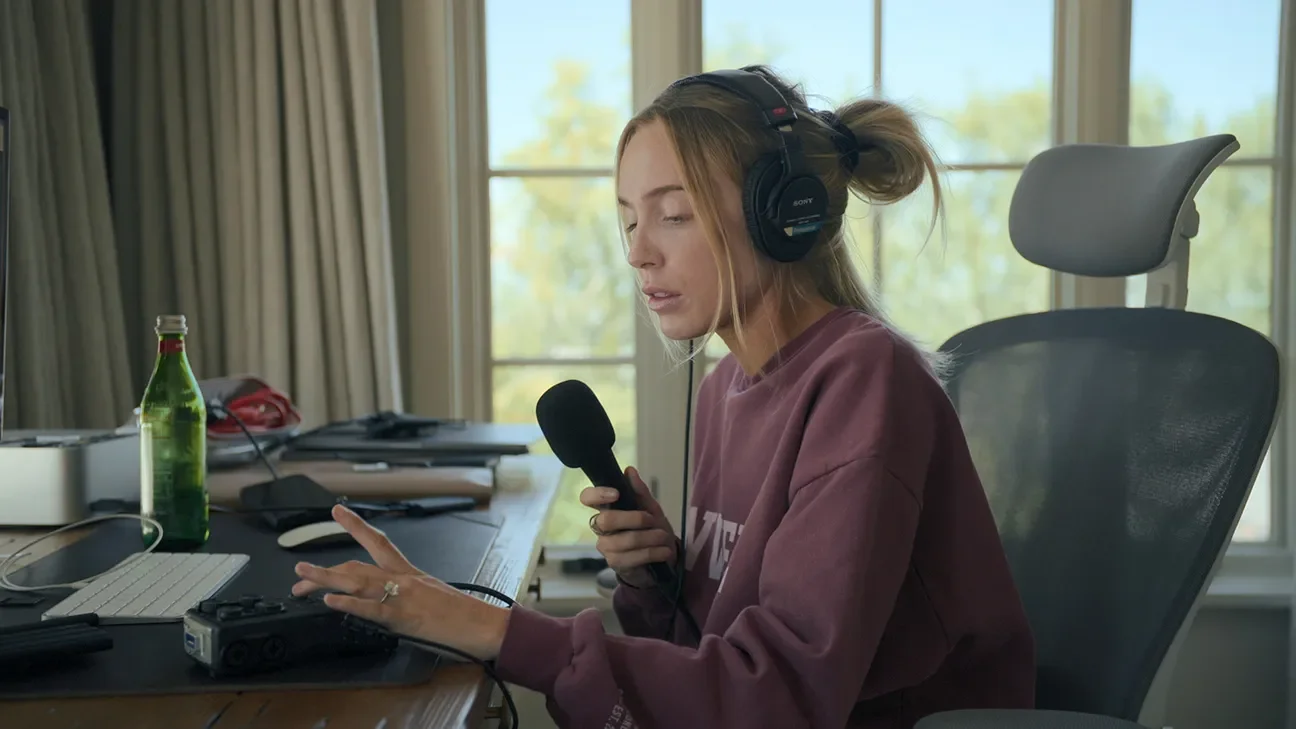The Evolution of Alex Cooper in Hulu’s 'Call Her Alex'
By Julia Krys
In Hulu’s new two-part docu-series Call Her Alex, directed by Ry Russo-Young, viewers are invited into the past and present of the multi-million-dollar empire Call Her Daddy. For anyone who was a teen or young adult during the pandemic, CHD was unavoidable. A raw, sex-positive cultural phenomenon that redefined podcasting. Listeners tuned in week after week for jaw-dropping, often scandalous stories that pushed boundaries and left little to the imagination. From step-by-step oral sex instructions to frank conversations about STDs, host Alex Cooper and her then-cohost Sofia Franklyn set out to shock, entertain, and empower. Their unfiltered nature was often educational in ways that health class never dared to be.
What makes the docu-series compelling, however, is its emphasis on contrast. Today’s Call Her Daddy greatly differs from its shock-jock origins, trading raunch for reflection. The podcast, once branded with tongue-in-cheek bravado, has matured alongside its creator. Through Call Her Alex, viewers watch Alex’s evolution: from a young woman who marketed herself as a human blow-up doll on subway posters to a media mogul sitting across from celebrities, cultural leaders, and even politicians.
Cooper may have made a career out of oversharing, but the grind behind her rise was a chapter we had not fully explored until now. The film illustrates how she navigated the hyper-masculine world of Barstool Sports’ New York offices, negotiating deals with executives who underestimated her, only to turn her podcast into a revenue machine. Merchandising alone became lucrative enough to cover the salaries of their staff. Moments like this are emblematic of her redefinition of the word “Daddy.” Instead of its ties to submission, it became a symbol of female authority, independence, and ownership–the reversal at the heart of the brand.
Still, the documentary is careful. It presents a polished version of Cooper’s story, designed not only for diehard fans but also for the uninitiated: those who have watched from the sidelines and wondered what all the hype was about. At times, it feels curated rather than confessional, but that in itself reflects Alex’s signature production style. As we watch the launch of her first-ever podcast tour, her measured approach to handling a performance of this scale mirrors the controlled creative direction she has applied to every facet of the brand’s voice.
Yes, it is highly produced. But it’s also the meditative outcome of a shrewd businesswoman who understands how to fuse pop culture, media literacy, and performance into a singular product. Ultimately, it feels difficult to fault her for the very control that has transformed Call Her Daddy into what it is today: a formidable, multi-million-dollar business.
For longtime fans, the obvious question loomed: with so much of Alex’s life already lived in public, would the documentary reveal anything new? Surprisingly, it did.
One of the most striking threads is Alex’s decision to speak openly about the sexual harassment she endured as a Division I athlete at Boston University. In recounting the experience (and the institution’s lackluster response) she joins a long line of women whose stories of abuse were mishandled or ignored. The frankness with which she revisits this trauma underscores both her vulnerability and her power. For a creator whose career began with performative shock value, this moment of personal honesty lands differently: less spectacle, more solidarity.
Another distinctive layer of the documentary is its focus on the psychological undercurrent of Alex’s work. When she severed business ties with her original co-host, Sofia Franklyn, Cooper faced the daunting task of carrying the show alone. For the “Daddy Gang” faithful, it marked a turning point: the podcast was no longer built solely on salacious storytelling but began weaving in conversations about self-development and introspection.
As a listener myself at the time, I was struck by how authentically she sustained this tonal shift. The film frames it as a natural extension of her own maturation into adulthood, but there’s a deeper throughline worth noting. A longstanding fluency in the language of psychology. With a feminist therapist for a mother, and formative experiences like helping a close collaborator navigate the death of her father to mental illness, Alex’s comfort discussing mental health seems less like a pivot and more like an inheritance. Even as she bounces between steamy relationship advice and moments of genuine inner reflection, a concern for her guests’ perspectives and well-being quietly anchors the show.
The timing of the documentary also adds weight. In a post–Roe v. Wade America, where conversations about women’s autonomy are increasingly politicized, revisiting the sex-positive roots of Call Her Daddy feels urgent. That urgency is compounded by Cooper’s recent high-profile interviews, including her sit-down with former Vice President and then-presidential candidate Kamala Harris. In this context, the documentary isn’t just a retrospective of a podcast; it’s a study of a woman carving out influence in an era when women’s voices remain contested terrain.
The larger takeaway resonates beyond Cooper herself. Call Her Alex underscores a creative truth echoed across media industries: the power of self-made storytelling. British host Amelia Dimoldenberg captured it in her Webby Awards acceptance speech when she said simply, “Make it yourself.” Cooper did. And in doing so, she transformed not only her career but also the cultural conversation about sex, power, and what it means to own your narrative.
In the end, Call Her Alex may not fully dismantle the inner workings of Alex Cooper, but it doesn’t need to. What it offers is something more valuable: a portrait of a woman who turned provocation into empire, spectacle into influence, and vulnerability into strength.



